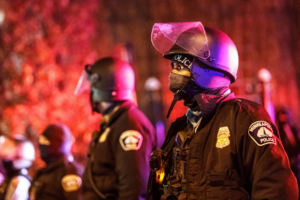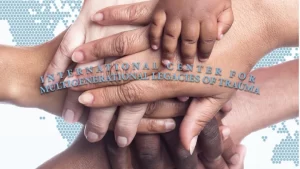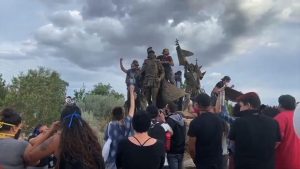A brutal attack by the Gran Grif gang in Haiti has left at least 70 people dead, including three infants, and forced around 3,000 people to flee their homes. The attackers stormed through the town of Pont-Sonde, firing automatic rifles indiscriminately, according to a report from the United Nations on Friday. The violence has once again highlighted the deepening crisis in the country as armed groups continue to expand their control.
Thameen Al-Kheetan, a spokesperson for the U.N., expressed the organization’s horror at the attack. “We are horrified by Thursday’s gang attacks in the town of Pont-Sonde in Haiti’s Artibonite department,” Al-Kheetan said in a public statement. In addition to the death toll, at least 16 people were seriously wounded during the early Thursday assault, including two gang members who were injured in a firefight with Haitian police forces.
Reports from the area indicate that the gang set fire to at least 45 homes and 34 vehicles, sending residents scrambling to escape. The event marks a further escalation of the violence gripping the Caribbean nation, where gangs already control much of the capital, Port-au-Prince, and have begun spreading their influence to rural regions. As the violence intensifies, hunger and displacement have also worsened, with many Haitians left homeless while neighboring countries continue to deport migrants back to Haiti.
Prime Minister Garry Conille voiced his condemnation of the attacks on X (formerly Twitter), calling them “an odious crime against defenseless women, men, and children.” He added that it was “an attack against the entire Haitian nation,” vowing that security forces would strengthen their efforts in the affected area. His office also confirmed that the public hospital in Saint-Marc was preparing to handle the influx of wounded victims.
Footage broadcast on Haitian online television showed local security forces moving into Pont-Sonde, where the aftermath of the assault included burnt-out vehicles and bullet casings littering the streets. Despite these efforts, the gang leader responsible for the attack, Luckson Elan, claimed in an audio message shared on social media that the victims themselves were to blame. Elan, who was recently sanctioned by the U.N., accused the residents of Pont-Sonde of passivity, stating, “It’s Pont-Sonde residents who are at fault. What happened in Pont-Sonde is the fault of the state.” The gang leader also blamed the police and vigilante groups for the deaths of his soldiers.
A Nation Under Siege
The Gran Grif gang has become infamous in Haiti for committing various atrocities, including mass kidnappings, rapes, and killings. The U.N. Security Council recently accused the group of destroying property and hijacking trucks while forcing farmers off their land under threats of death. Particularly troubling is the gang’s recruitment of children, which has reached alarmingly high levels.
Compounding the problem is Haiti’s paralyzed judicial system, which has been unable to bring justice for the numerous atrocities committed since 2021. Notably, several massacres, some dating back to 2017, remain unsolved. The police themselves have faced accusations of involvement in massacres. One prominent gang leader, Jimmy “Barbeque” Cherizier, a former police officer, has been accused by the U.N. of orchestrating the 2018 killing of 71 civilians in the La Saline neighborhood of Port-au-Prince. The ongoing closure of Haiti’s main port due to gang violence has only worsened the country’s already dire food shortages.
Call for Action
Pont-Sonde, located in Haiti’s Artibonite region, is a key agricultural area known for its rice production. The region has faced increasing violence, exacerbating the country’s growing hunger crisis. As of now, half of Haiti’s population faces severe food insecurity, with many in the capital on the brink of famine. Cherizier, representing an alliance of gangs in the capital, claimed that the attack on Pont-Sonde was part of a larger strategy to prevent the region from supplying food to the rest of the country.
The number of internally displaced Haitians has surged to over 700,000, nearly doubling in just six months. This increase has occurred despite the deployment of a U.N.-backed mission aimed at helping local police restore order. However, the mission has faced significant challenges. International pledges of financial and logistical support have fallen short, with only a fraction of promised resources and personnel arriving in Haiti. Kenya has been the largest contributor, providing around 400 police officers to the mission, but the need for more international assistance remains critical.
Raouf Mazou, an official with the U.N.’s refugee agency, urged the world not to ignore the growing crisis in Haiti. “We cannot turn a blind eye,” he said, highlighting shortages in food, medicine, and humanitarian aid, which continue to be blocked due to the violence. U.N. spokesperson Al-Kheetan echoed these concerns, calling for increased financial and logistical support alongside reparations for the victims of the gang violence.
Despite numerous international pledges to help stabilize the situation, Haiti has yet to receive the full assistance it was promised. Deportation flights organized by countries such as the United States and the United Kingdom, which send migrants back to Haiti, have continued despite repeated calls by the U.N. to halt these flights. The U.N. estimates that gang-related violence has claimed the lives of over 3,600 Haitians since January alone.
A Cry for Global Attention
Haiti continues to struggle under the weight of gang violence and humanitarian disaster. Despite international promises of assistance, the country faces worsening food shortages, mass displacement, and a paralyzed justice system. The U.N. has called for urgent action, and until the world responds with substantial support, the suffering of the Haitian people will only continue to grow. The situation remains critical, with no clear end in sight.Shocking Revelations in Trump Case Highlight Rift with Pence Over 2020 Election




